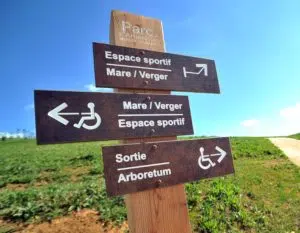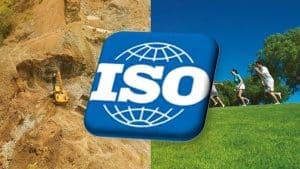ESG action areas
Environment
- Contributing to the construction industry’s circular economy
- Designing biodiversity-friendly facilities
- Protecting ecosystems during construction phases
- Controlling invasive alien plant species
- Reducing GHG emissions
- Raising awareness of key sustainable development issues
Social
Relationships and working conditions
- Guaranteeing safety in the workplace
- Promoting diversity and equal opportunity
- Fostering employee commitment
Social
Development and well-being
- Contributing to regional development
- Supporting agricultural development
- Contribute to public health by reconnecting people with nature and giving them access to outdoor sports and leisure activities.
- Optimizing the local integration of our sites
Implementation of CSR policy
Environment
Contributing to the construction industry’s circular economy
- ECT transforms excavated earth from the construction industry into a resource : a noble material for environmentally and socially responsible landscaping.
- We have also developed a direct business manufacturing fertile substrate, a local and 100% recycled solution, an alternative to imported topsoil.
Designing facilities to promote biodiversity
- Since 2019, ECT has signed a charter of commitment to biodiversity with the environmentalist and naturalist association Humanité et Biodiversité.
- In the design of its facilities, ECT is able to recreate environments and habitats conducive to biodiversity. In this way, we can reinforce green networks and consolidate the richness of species and environments.
- A specific approach to combating the proliferation of invasive plants is being developed for 2022.
Controlling Invasive Alien Species (IAS)
- Raising awareness and training teams in best practices.
- Identify and mark out areas to avoid on foot or with construction machinery.
- Contain and remove EVEE on our sites
Protecting ecosystems during construction and development phases
- Our enhanced soil traceability processes, from the excavation site through to checks at ECT sites, mean that we can systematically refuse to accept soil with pollution risks.
- ECT does not use phytosanitary products during the construction and maintenance of its green spaces, and promotes differentiated management techniques such as late mowing.
- Since March 2023, ECT has been awarded the national label Entreprise Engagée pour la Nature awarded by the OFB
Reducing GHG emissions
- Our network of soil reception and development sites, located close to the main building construction areas, tends to limit the distance travelled by our construction customers to evacuate their excavated soil, thereby reducing truck GHG emissions.
- ECT contributes to the development of photovoltaic farms, in partnership with Akuo, as in Annet-sur-Marne (77), with the construction of a 17 MWp solar power plant.
Combating the effects of climate change
- The creation of urban parks and nature areas (re)creates islands of coolness and helps to sequester CO2. ECT plants between 10,000 and 30,000 trees a year.
- This renaturation implies that the soils of ECT’s developments are permeable and that the company restores their main ecosystem functions. Our facilities contribute to the ZAN objective.
- At a time when torrential rains are on the increase, the design of our sites aims to improve the hydrological performance of soils, by enhancing their capacity to infiltrate and retain rainwater.
Raising awareness of key sustainable development issues
- In partnership with the Humanité & Biodiversité association, ECT has set up a biodiversity awareness program for its employees.
- ECT offers primary schools in communities close to its sites an educational module that can be integrated into Education for Sustainable Development (ESD ), as well as planting operations ” un enfant, un arbre “. Every year, nearly 300 children take part in these activities.
- ECT is developing academic exchanges with schools and universities around the themes of sustainable cities and urban engineering(EIVP) and urban agriculture (Ecole du Breuil).
ECT project to transform a landfill site into an agricultural and ecological site at Boissy/Puiseux (Val d’Oise -95)
©Gil Fornet
Social
Development and well-being
Contributing to regional development
- The identification of brownfield sites and land for redevelopment is accompanied by a dialogue with local authorities to define the new, undeveloped use of the site, in line with local needs and aspirations.
- The development and maintenance of the sites help to create local jobs.
Supporting agricultural development
- Our projects enable us to rehabilitate agricultural land and increase the area under cultivation.
- These projects are often accompanied by a move towards conservation agriculture.
Contributing to public health
- The development of green spaces and urban recreation areas reconnects urban dwellers with nature, a source of mental well-being and physical relaxation, particularly through the practice of outdoor sports.
Optimizing the local integration of our sites
- Limiting inconvenience to local residents is one of the keys to local dialogue. Site management and phasing take into account safe access to the site, as well as noise pollution, dust control and road damage.
Social
Relationships and working conditions
Guaranteeing safety in the workplace
- The company ensures compliance with the safety rules put in place to guarantee safe working conditions for its employees, subcontractors and customers.
- ECT has set itself the target of zero “responsible” accidents, with the introduction of “safety flashes” and regular accident prevention training. The company’s accident rate is lower than in comparable sectors.
Promoting diversity and equal opportunity
- The company is firmly committed to combating all forms of discrimination, and has made diversity and equal opportunity one of its core values. This commitment is formalized in our Ethics Charter.
- ECT also has a higher proportion of women in management and executive positions than companies in comparable sectors.
Fostering employee commitment
- Human resources management is an essential factor in attracting and retaining talent and ensuring our long-term development. Internal promotion is encouraged and valued. New arrivals benefit from a comprehensive integration program.
- The company’s absenteeism rate is very low (by the standards of comparable companies).
- ECT has set up a fair profit-sharing policy, linked to the company’s financial results, based on time worked and not on the employee’s initial salary.
Human Resources management is an essential factor in ECT’s development
© Gil Fornet / ECT
Governance
Managing sustainability issues
- To assess the contribution and impact of its projects to sustainability objectives, ECT has defined 16 operational environmental and societal indicators. The aim is to manage the impact of our business decisions on the sustainability of our activity.
- For each indicator, a calculation rule (developed in the ” rules of the art ” of the subject) is used to establish a score from 0 to 10 illustrating the site’s performance on the different ESG topics addressed by the indicator.
Fair practices with all stakeholders
- ECT applies a ” zero tolerance ” policy against corruption and anti-competitive behavior.
- Strict control procedures are in place, and financial flows are regularly verified and validated both internally and externally. These procedures are reinforced by the commitments of its Ethics Charter, which will be implemented in 2021.


